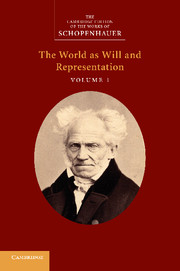Book contents
- Frontmatter
- Contents
- General editor's preface
- Editorial notes and references
- Introduction
- Notes on text and translation
- Chronology
- Bibliography
- THE WORLD AS WILL AND REPRESENTATION VOLUME 1
- Preface to the first edition
- Preface to the second edition
- Preface to the third edition
- First Book: The world as representation, first consideration. Representation subject to the principle of sufficient reason: the object of experience and science
- Second Book: The world as will, first consideration. The objectivation of the will
- Third Book: The world as representation, second consideration. Representation independent of the principle of sufficient reason: the Platonic Idea: the object of art
- Fourth Book: The world as will, second consideration. With the achievement of self-knowledge, affirmation and negation of the will to life
- Appendix: Critique of the Kantian Philosophy
- Variants in different editions
- Glossary of names
- Index
First Book: The world as representation, first consideration. Representation subject to the principle of sufficient reason: the object of experience and science
Published online by Cambridge University Press: 06 December 2010
- Frontmatter
- Contents
- General editor's preface
- Editorial notes and references
- Introduction
- Notes on text and translation
- Chronology
- Bibliography
- THE WORLD AS WILL AND REPRESENTATION VOLUME 1
- Preface to the first edition
- Preface to the second edition
- Preface to the third edition
- First Book: The world as representation, first consideration. Representation subject to the principle of sufficient reason: the object of experience and science
- Second Book: The world as will, first consideration. The objectivation of the will
- Third Book: The world as representation, second consideration. Representation independent of the principle of sufficient reason: the Platonic Idea: the object of art
- Fourth Book: The world as will, second consideration. With the achievement of self-knowledge, affirmation and negation of the will to life
- Appendix: Critique of the Kantian Philosophy
- Variants in different editions
- Glossary of names
- Index
Summary
Sors de l'enfance, ami, réveille-toi!
Jean-Jacques Rousseau[‘Wake up, my friend, and leave childish things behind!’
– La Nouvelle Héloïse, V, I]‘The world is my representation’: – this holds true for every living, cognitive being, although only a human being can bring it to abstract, reflective consciousness: and if he actually does so he has become philosophically sound. It immediately becomes clear and certain to him that he is not acquainted with either the sun or the earth, but rather only with an eye that sees a sun, with a hand that feels an earth, and that the surrounding world exists only as representation, that is, exclusively in relation to something else, the representing being that he himself is. – If any a priori truth can be asserted, then this is it; for this truth expresses the form of all possible and conceivable experience. This form is more universal than any other form, more universal than time, space and causality, which, in fact, presuppose it. If each of these forms (which we have recognized as so many particular forms of the principle of sufficient reason) applies only to a particular class of representations, then by contrast, subject/object dichotomy is the general form of all these classes. It is the only form under which any representation – whatever kind it may be, abstract or intuitive, pure or empirical – is possible or even conceivable.
- Type
- Chapter
- Information
- Schopenhauer: 'The World as Will and Representation' , pp. 23 - 118Publisher: Cambridge University PressPrint publication year: 2010

